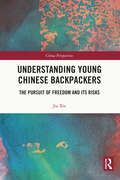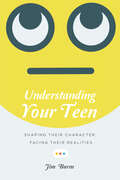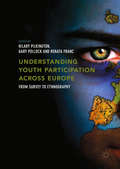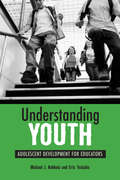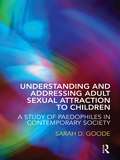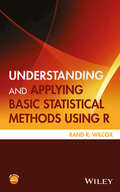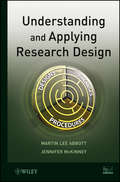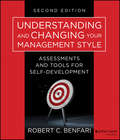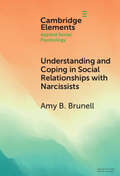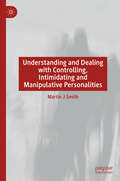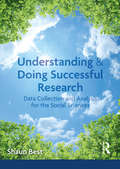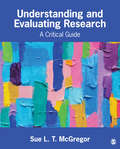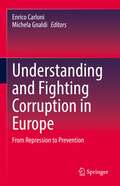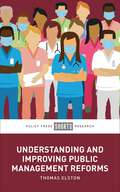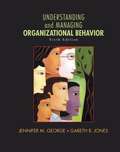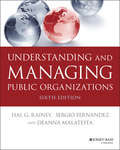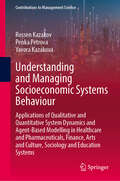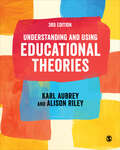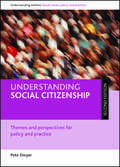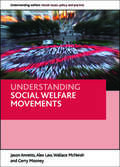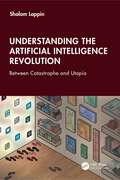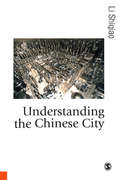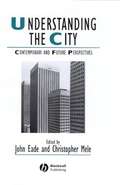- Table View
- List View
Understanding Young Chinese Backpackers: The Pursuit of Freedom and Its Risks (China Perspectives)
by Jia XieAn activity that originated in Western societies, backpacking has gained increasing popularity among Chinese millennials. In a spirit of the ‘search for self’, young Chinese backpackers have sought to display their pursuit of freedom, independence and responsibility within an increasingly individualised society through backpacking. This volume investigates contemporary young Chinese persons’ views on backpacking culture and backpackers. A group of Chinese backpackers are studied using interview and participant observation, and focus groups are conducted to study young professionals’ and university students’ attitudes towards backpacking. The results indicate a profound cultural change along with a degree of division. On the one hand, the backpackers often begin their journey due to a desire to pursue freedom, and use the pursuit as a process of reflexive awareness; on the other hand, the risks of pursuing a freewheeling lifestyle within an individualised society drive the majority of them to return home. The author concludes that this phenomenon is a kind of ‘staged individualism’, describing how Chinese millennials strike a balance between individual interests and wider social obligations. Students and scholars of sociology tourism, and youth culture will be interested in this volume.
Understanding Your Teen: Shaping Their Character, Facing Their Realities
by Jim BurnsParenting teenagers is one of the biggest challenges parents face. New realities make becoming independent more difficult. Teens are traveling a different road and are moving at a different pace than those of previous generations. Today's cultural environment is more complicated and confusing than ever. But fear not! Family expert Jim Burns provides a handy guide for parenting teens. For teens to become responsible adults, parents need to help them grow through developmental changes to attain a healthy self-identity, establish good relationships, make wise decisions, and grow in their relationship with God. Burns shows how parents can shape behavior and character, navigate social media challenges, and communicate and resolve conflict healthily. He also tackles the realities of our day, including cyberbullying, dating violence, self-injury, depression, and much more. Whether you're facing serious troubles or looking for simple tips for a better family life, this book offers help and hope.
Understanding Youth Participation Across Europe
by Hilary Pilkington Gary Pollock Renata FrancThis edited volume presents findings from a major cross-European research project mapping the civic and political engagement of young Europeans in the context of both shared and diverse political heritages. Drawing on new survey, interview and ethnographic data, the authors discuss substantive issues relating to young people's attitudes and activism including: attitudes to the European Union and to history; understanding of political ideologies; how attitudes to democracy are shaped by political herita≥ activism in radical right wing groups and religion-based organisations; and digital activism. These contributions make the book's case that transnational and multi-method projects can enrich our understanding of how young people envisage their place and role in Europe's political and civic space. The book challenges methodological assumptions that survey research shows the big picture but at the cost of local nuance or that qualitative research cannot speak beyond the individual case, and demonstrates the added explanatory value of triangulating different kinds of data. Understanding Youth Participation Across Europe will be of interest to students and scholars across a range of disciplines, including Sociology, Political Sociology, Youth Studies and Political and Civic Participation.
Understanding Youth: Adolescent Development for Educators
by Michael J. Nakkula Eric ToshalisAdolescent development research and theory have tremendous potential to inform the work of high school teachers, counselors, and administrators. Understanding Youth bridges the gap between adolescent development theory and practice. Nakkula and Toshalis explore how factors such as social class, peer and adult relationships, gender norms, and the media help to shape adolescents&’ sense of themselves and their future expectations and aspirations.
Understanding and Addressing Adult Sexual Attraction to Children: A Study of Paedophiles in Contemporary Society
by Sarah D. GoodePaedophiles exist and we must develop ways of living with this fact whilst ensuring that children are kept safe. This ground-breaking book demystifies the field of adult sexual attraction to children, countering the emotionality surrounding the topic of paedophilia in the popular media by careful presentation of research data and interview material. Addressing how we can work together to reduce sexual offending in this population, this text bridges the gulf in understanding between those who want to protect children and those who feel sexual attraction to children – and recognises that they are sometimes the same people. Sarah D. Goode provides an overview of the topic by defining the term 'paedophile' and discussing how many adults there may be in the general population who find themselves sexually attracted to children. She looks at how the Internet has acted as an enabler, with an explosion of child pornography and 'pro-paedophile' websites. Drawing on data from a sample of fifty-six self-defined paedophiles living in the community, she explores themes including self-identity, the place of fantasy and the forms of support available to paedophiles. Her research highlights the scale of debate within the 'online paedophile community' about issues such as the morality of sexual contact with children and encouragement to maintain a law-abiding lifestyle. Throughout, she draws careful distinctions between sexual attraction to children and sexual contact with children. The book concludes with a valuable discussion on how adult sexual contact harms children and examples of a range of initiatives which work to protect children and prevent offending. Suitable for all professionals who work with children or sexual offenders, this book gives clear guidance on what one needs to know and do to ensure children are kept safe. It will also be of interest to students studying child protection, paedophilia and child sexual abuse within other social science disciplines.
Understanding and Applying Basic Statistical Methods Using R
by Rand R. WilcoxFeatures a straightforward and concise resource for introductory statistical concepts, methods, and techniques using R Understanding and Applying Basic Statistical Methods Using R uniquely bridges the gap between advances in the statistical literature and methods routinely used by non-statisticians. Providing a conceptual basis for understanding the relative merits and applications of these methods, the book features modern insights and advances relevant to basic techniques in terms of dealing with non-normality, outliers, heteroscedasticity (unequal variances), and curvature. Featuring a guide to R, the book uses R programming to explore introductory statistical concepts and standard methods for dealing with known problems associated with classic techniques. Thoroughly class-room tested, the book includes sections that focus on either R programming or computational details to help the reader become acquainted with basic concepts and principles essential in terms of understanding and applying the many methods currently available. Covering relevant material from a wide range of disciplines, Understanding and Applying Basic Statistical Methods Using R also includes: Numerous illustrations and exercises that use data to demonstrate the practical importance of multiple perspectives Discussions on common mistakes such as eliminating outliers and applying standard methods based on means using the remaining data Detailed coverage on R programming with descriptions on how to apply both classic and more modern methods using R A companion website with the data and solutions to all of the exercises Understanding and Applying Basic Statistical Methods Using R is an ideal textbook for an undergraduate and graduate-level statistics courses in the science and/or social science departments. The book can also serve as a reference for professional statisticians and other practitioners looking to better understand modern statistical methods as well as R programming.
Understanding and Applying Research Design
by Martin Lee Abbott Jennifer MckinneyA fresh approach to bridging research design with statistical analysis While good social science requires both research design and statistical analysis, most books treat these two areas separately. Understanding and Applying Research Design introduces an accessible approach to integrating design and statistics, focusing on the processes of posing, testing, and interpreting research questions in the social sciences.The authors analyze real-world data using SPSS software, guiding readers on the overall process of science, focusing on premises, procedures, and designs of social scientific research. Three clearly organized sections move seamlessly from theoretical topics to statistical techniques at the heart of research procedures, and finally, to practical application of research design:Premises of Research introduces the research process and the capabilities of SPSS, with coverage of ethics, Empirical Generalization, and Chi Square and Contingency Table AnalysisProcedures of Research explores key quantitative methods in research design including measurement, correlation, regression, and causationDesigns of Research outlines various design frameworks, with discussion of survey research, aggregate research, and experimentsThroughout the book, SPSS software is used to showcase the discussed techniques, and detailed appendices provide guidance on key statistical procedures and tips for data management. Numerous exercises allow readers to test their comprehension of the presented material, and a related website features additional data sets and SPSS code.Understanding and Applying Research Design is an excellent book for social sciences and education courses on research methods at the upper-undergraduate level. The book is also an insightful reference for professionals who would like to learn how to pose, test, and interpret research questions with confidence.
Understanding and Changing Your Management Style: Assessments and Tools for Self-Development (J-B Warren Bennis Series #176)
by Robert C. BenfariAn update of the classic book that reveals the 6 keys to successful management In this new edition of his best-selling book, Robert Benfari explains that the best mangers are not born that way but share a mix of characteristics that can be analyzed, understood, and most importantly changed. He identifies the six characteristics of successful managers (Psychological Type; Needs/Motivation; Use of Power; Conflict Style; Our Basic Values; and Our Reaction to Stress) and uses these building blocks to show how anyone can use personality-specific strategies for resolving conflicts, solving problems, managing stress, handling difficult situations at work, and positively influencing others. Includes a proven pathway for becoming an effective manager Contains new information on management style and leadership, human nature and neuroscience, and the dark side of management Includes a self-assessment for each of the six building blocks to successful management This research-based book offers the tools leaders need to improve their management style and succeed in the workplace.
Understanding and Coping in Social Relationships with Narcissists (Elements in Applied Social Psychology)
by Amy B. BrunellNarcissism is a trait that comes in different forms (agentic, communal, and vulnerable), which are all marked by characteristics such as entitlement, self-centeredness, and little empathy for others. One reason narcissism has gained attention among scholars and laypeople alike is because of its implications for social relationships. Narcissists' behaviors frequently have negative consequences for others. Whether their relationships are with coworkers or close relationship partners, interactions with narcissists can be challenging and emotionally taxing. Despite this, there is a sparse amount of research that addresses how to cope with difficult narcissistic relationships. This Element includes an overview of the trait forms of narcissism and discusses its implications for their social relationships. It provides a background about the development of narcissism and offers some research-informed suggestions for how to cope in narcissistic relationships. Future directions for research are also discussed.
Understanding and Dealing with Controlling, Intimidating and Manipulative Personalities
by Martin J SmithThis book will examine at individuals who control, intimate, and manipulate in work, home, family, and social environments, using robust Psychological theory to comprehend and successfully tackle those who exhibit these behaviours. The focus of this book will be to look at general Personality theory together with more specific focus on the Dark Triad of personality traits and, from the Five Factor Model, the domain of Agreeableness vs Antagonism. This approach will build a greater understanding of a much broader form of controlling intimidating and manipulative personality type. The book will include both useable techniques as well as self-reflection exercises the reader can use or pass on to students, clients and service users. This book is based on a programme the author has been teaching for over twelve years to a range of audiences across a variety of roles and has also been highlighted frequently in the press over the past decade.
Understanding and Doing Successful Research: Data Collection and Analysis for the Social Sciences
by Shaun BestResearch Methods is an essential guide to carrying out a research project. Each of the focused chapters introduces and explains an aspect of social research to readers who may have no experience or knowledge of this subject. The emphasis is on 'how to do' various different methods, how to decide which is the most appropriate, and how to analyse the data. The book also includes examples of good practice from a range of social science disciplines.
Understanding and Evaluating Research: A Critical Guide
by Sue L. McGregorUnderstanding and Evaluating Research: A Critical Guide shows students how to be critical consumers of research and to appreciate the power of methodology as it shapes the research question, the use of theory in the study, the methods used, and how the outcomes are reported. The book starts with what it means to be a critical and uncritical reader of research, followed by a detailed chapter on methodology, and then proceeds to a discussion of each component of a research article as it is informed by the methodology. The book encourages readers to select an article from their discipline, learning along the way how to assess each component of the article and come to a judgment of its rigor or quality as a scholarly report.
Understanding and Evaluating Research: A Critical Guide
by Sue L. McGregorUnderstanding and Evaluating Research: A Critical Guide shows students how to be critical consumers of research and to appreciate the power of methodology as it shapes the research question, the use of theory in the study, the methods used, and how the outcomes are reported. The book starts with what it means to be a critical and uncritical reader of research, followed by a detailed chapter on methodology, and then proceeds to a discussion of each component of a research article as it is informed by the methodology. The book encourages readers to select an article from their discipline, learning along the way how to assess each component of the article and come to a judgment of its rigor or quality as a scholarly report.
Understanding and Fighting Corruption in Europe: From Repression to Prevention
by Michela Gnaldi Enrico CarloniThe volume includes comparative and comprehensive discussions on anti-corruption policies of governments and anti-corruption agencies across Europe. Compared to existing literature that focuses either on general and theoretical aspects related to corruption or on country-specific experiences, this volume provides an interdisciplinary and broad overview of corruption prevention policies and measures undertaken by major European member states, relying both on literature and on institutional documentation of national anti-corruption agencies, which greatly contribute to shaping anti-corruption policy directions. In so doing, it advances the existing theoretical agenda of corruption studies and policies, situating it within wider disciplinary fields. This volume is especially concerned with the interrelationship between good administration, integrity, ethical behaviour and corruption; the role of transparency and digitalisation in preventing corruption and ensuring rights, efficiency and impartiality in the public administration; the measurement of corruption, with specific reference to preventative measures and indicators of administrative anti-corruption efforts; big data, block chains, and artificial intelligence; public management codes of ethics, performance targets and skills, and their role in tackling and preventing corruption; and public procurement, transparency and anti-bribery measures in the European public procurement system. This volume is of interest to graduate students and researchers in political sociology, political science, European corruption law, international relations, public policy, and social statistics.
Understanding and Improving Public Management Reforms
by Thomas ElstonWhy do top-down reforms to public services so often over-promise and under-deliver? Using five concepts from psychology, economics and organisational sociology, Thomas Elston addresses this pressing question of good governance. Rather than focusing on the challenge of implementation, Understanding and Improving Public Management Reforms reveals how flawed policy design is often the major contributor to reform failure. Cognitive bias, restrictive social institutions and inattention to ‘quiet costs’ during the policy-making process are essential to explaining the poor track record of reforms to date – and point the way towards better decision-making in future. Written for policy professionals, service managers, students and researchers alike, this concise, practical and multidisciplinary study draws on varied examples to help reconceive the perennial problem of public management reform – and to propose new solutions.
Understanding and Managing Organizational Behavior
by Gareth R. Jones Jennifer M. GeorgeVivid examples, thought-provoking activities--get engaged in OB. George/Jones uses real-world examples, thought- and discussion-provoking learning activities to help readers become more engaged in what they are learning. This text also provides the most contemporary and up-to-date account of the changing issues involved in managing people in organizations. The sixth edition features new cases, material addressing the economic crisis, and expanded coverage of ethics and workplace diversity.
Understanding and Managing Public Organizations (Essential Texts for Nonprofit and Public Leadership and Management)
by Hal G. Rainey Sergio Fernandez Deanna MalatestaDiscover the latest insights in organization theory from a comprehensive and masterful volume Understanding and Managing Public Organizations, 6th Edition provides readers with an authoritative reference for scholars, masters, and doctoral students in public management and public affairs programs in the United States and other nations. The 6th Edition of Understanding and Managing Public Organizations presents the latest research and insights from organization and management theory and their application to public organizations and the people in them. The book expands coverage from previous editions about organizational goals, performance and effectiveness, strategy, decision-making, structure and design, organizational change, operating environments, individuals and groups, motivation and work-related attitudes, leadership, teamwork, and more. Authors and professors Hal Rainey, Sergio Fernandez, and Deanna Malatesta provide new and expanded coverage of such topics as The context and distinctive character of public and nonprofit organizations, including expanded coverage of "publicness" and of the legal context including "state action" Performance management, measurement, organizational effectiveness, and managing for high performance Representative bureaucracy, workforce diversity, and performance Communication and information technology Employee engagement and empowerment, intrinsic motivation, self-determination theory, public service motivation, and positive organizational behavior—resilience, self-efficacy, optimism, and hope Recent developments in theory and thought on leadership, including authentic leadership, shared leadership, servant leadership, and integrated leadership Design and process topics including red tape and green tape, administrative burdens, and organizational routines Theoretical perspectives such as behavioral theory of decision making, resource dependence theory, and others, and their implications for public and nonprofit organizations Advances in theory and practice about rapid developments in collaborative governance, organizational networks, partnerships, and contracting Since the book is used in courses for students in numerous public affairs programs, this new edition updates the Instructor’s Guide, with new and revised PowerPoint slides, cases, exercises, and discussion and examination questions These materials, with the topics in the chapters, are designed to address the learning outcomes required by NASPAA accreditation requirements Belonging on the shelf of scholars and students in public affairs, as well as anyone interested in public management or organization theory, this new edition of Understanding and Managing Public Organizations provides an advanced and comprehensive enhancement to a widely used and compelling series of previous editions.
Understanding and Managing Socioeconomic Systems Behaviour: Applications of Qualitative and Quantitative System Dynamics and Agent-Based Modelling in Healthcare and Pharmaceuticals, Finance, Arts and Culture, Sociology and Education Systems (Contributions to Management Science)
by Rossen Kazakov Penka Petrova Yavora KazakovaThis book illustrates effective decision-making in complex socio-economic systems utilising system dynamics and agent-based simulation modelling approaches. It provides practical guidance on the application of conceptual and numerical modelling and simulation for analysing economic, strategic, regulatory, sociological and ethical questions from a complex systems perspective. Its theoretical, methodological and practical illustrations will enhance readers’ understanding of the application of simulation modelling for effective systems management. By virtually experimenting with alternative management scenarios, it will help them improve decision-making and control mechanisms. The book explores practical examples from the fields of pharmaceuticals, healthcare, finance, sociology, education and culture from a strategic, regulatory and ethics perspective. As such, it offers a valuable resource for managers, both at for-profit corporations and non-profit organisations, public policymakers and regulators alike.
Understanding and Using Educational Theories
by Karl Aubrey Alison RileyThis textbook gives readers a clear overview of a selection of 19 of the most influential thinkers on education, including established names (Vygotsky, Bruner, Dewey), more recent thinkers (Freire, hooks, Claxton) and other key names whose writing has helped shaped our views on teaching and learning. Each chapter includes practical examples showing how theories can be used to inform classroom teaching, and critiques of each theorist exploring opposing viewpoints and the strengths and weaknesses of different ideas. This third edition includes: New chapters on Barak Rosenshine and Daniel Goleman Revamped reflective tasks with a greater practical focus for the classroom More models and theoretical diagrams throughout This is an essential primer for any university course that includes learning theory, with particular relevance for initial teacher education, education studies and early childhood degrees. Karl Aubrey has recently retired from his post at Bishop Grosseteste University. Alison Riley is the Programme Leader for the BA Early Childhood Studies at Bishop Grosseteste University.
Understanding and Using Educational Theories
by Karl Aubrey Alison RileyThis textbook gives readers a clear overview of a selection of 19 of the most influential thinkers on education, including established names (Vygotsky, Bruner, Dewey), more recent thinkers (Freire, hooks, Claxton) and other key names whose writing has helped shaped our views on teaching and learning. Each chapter includes practical examples showing how theories can be used to inform classroom teaching, and critiques of each theorist exploring opposing viewpoints and the strengths and weaknesses of different ideas. This third edition includes: New chapters on Barak Rosenshine and Daniel Goleman Revamped reflective tasks with a greater practical focus for the classroom More models and theoretical diagrams throughout This is an essential primer for any university course that includes learning theory, with particular relevance for initial teacher education, education studies and early childhood degrees. Karl Aubrey has recently retired from his post at Bishop Grosseteste University. Alison Riley is the Programme Leader for the BA Early Childhood Studies at Bishop Grosseteste University.
Understanding social citizenship: Themes and perspectives for policy and practice (Understanding Welfare: Social Issues, Policy and Practice)
by Peter DwyerThis updated and revised edition of Understanding social citizenship is still the only citizenship textbook written from a social policy perspective. It provides students with an understanding of the concept of citizenship in relation to UK, EU and global welfare institutions; covers a range of welfare debates and issues; explores inclusion and exclusion; combines analysis and discussion of social policies and uses easy-to-digest text boxes. The revised second edition contains new topical sections on 'Cameron's Conservatism' and the EU and A8/10 migration in the UK. The book is essential reading for undergraduates in social policy, sociology, social work, politics and citizenship, A/AS level students and their teachers, and those on access courses, foundation degrees and teacher training courses.
Understanding social welfare movements (Understanding Welfare: Social Issues, Policy and Practice)
by Alex Law Jason AnnettsContemporary social policy has never been more vigorously contested. Issues range from single-issue campaigns over housing, social care, hospital closures through to organised movements around disability, environment, health and education. However, the historical and contemporary role played by social movements in shaping social welfare has too often been neglected in standard social policy texts. Understanding social welfare movements is the first text to bring together social policy and social movement studies. Using actual case studies and written in an accessible and engaging style, it will attract a wide readership of undergraduate and postgraduate students, higher education teachers and researchers, stakeholders and activists. Introductory chapters examine the historical and theoretical relationship between state welfare and social movements. Subsequent chapters outline the historical contribution of various social movements to the creation of the welfare state relating to Beveridge's 'five giants' of idleness, ignorance, squalor, illness and want. The book then examines the contemporary challenge posed by 'new social movements' in relation to the family, discrimination, environment, and global social justice. The book provides a timely and much needed overview of the changing nature of social welfare as it has been shaped by the demands of social movements.
Understanding the Artificial Intelligence Revolution: Between Catastrophe and Utopia
by Shalom LappinAfter many years during which it languished in relative obscurity, in remote classrooms of computer science departments and in small prototype projects for tech companies, artificial intelligence (AI) is now a searingly hot topic across the media. Yet much of the public discussion is so feverish that an understanding of the basic scientific and engineering elements of the field is easily lost, often resulting in exaggerated claims, as well as dangerously neglected threats.This concise and sober book presents a brief history of AI, explaining in clear language the central engineering innovations that have produced the current revolution. It distinguishes between imagined dangers and the very real problems that AI is creating. Spread across seven short and accessible chapters, this book explains the developments behind deep learning and the applications of deep neural networks (DNNs). It addresses both the imagined and actual risks posed by the AI revolution, before outlining the elements of a rational public policy on AI, covering topics like tech monopolies, disinformation, bias, hate speech, intellectual property rights, and inequality.Suitable for the general reader, Understanding the Artificial Intelligence Revolution: Between Catastrophe and Utopia is the ideal book for anyone seeking a clear and informed introduction to AI.
Understanding the Chinese City (Published in association with Theory, Culture & Society)
by Li ShiqiaoThis book teaches us to read the contemporary Chinese city. Li Shiqiao deftly crafts a new theory of the Chinese city and the dynamics of urbanization by: exploring the rise of stories of labour, finance and their hierarchies examining how the Chinese city has been shaped by the figuration of the writing system analyzing the continuing importance of the family and its barriers of protection against real and imagined dangers demonstrating how actual structures bring into visual being the networks of safety in personal and family networks. Understanding the Chinese City elegantly traces a thread between ancient Chinese city formations and current urban organizations, revealing hidden continuities that show how instrumental the past has been in forming the present. Rather than becoming obstacles to change, ancient practices have become effective strategies of adaptation under radically new terms.
Understanding the City: Contemporary and Future Perspectives (IJURR Studies in Urban and Social Change Book Series #47)
by Christopher Mele John EadeThis cutting-edge, multi-disciplinary analysis looks ahead to the direction which urban studies is likely to take during the twenty-first century.
